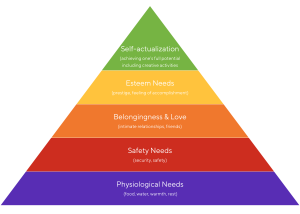If you want to develop your personal strengths, positive self-talk is crucial. It’s not something that only happens in our heads and ends – it’s a form of communication with ourselves.
The good news is that self-talk, especially when rooted in a deep understanding of our personal strengths, can be used to improve our lives and achieve things we might not have otherwise been able to do. By taking the HIGH5 strengths test, you can uncover your unique strengths and use them as a foundation for powerful, positive self-talk. This self-awareness allows you to get advice not just from yourself, but from the best version of yourself – the one that knows and leverages your innate talents.
The great news is that the more you practice positive self-talk, the easier it will become to stop negative self-talk and replace it with a positive one. This article will show you how.
What is Positive Self-Talk?
Self-talk is not only about having a conversation with yourself, but it’s more like self-encouragement. We all know that encouragement from others can be life-changing; imagine what it does for you when you’re the one giving this type of advice to yourself.
Self-talk should be encouraging, uplifting, and grounded in your authentic strengths. By taking the HIGH5 strengths assessment, you can identify your top five strengths, providing a solid foundation for realistic and empowering self-talk. This strengths-based approach to self-talk not only helps you achieve your goals through positive reinforcement but also ensures that your internal dialogue is aligned with your natural talents and abilities. When your self-talk reflects your true strengths, it becomes a powerful tool for personal growth and achievement.
Your subconscious mind knows everything around you, including what other people are saying about you. Self-talk affects how your subconscious mind perceives things, resulting in feelings or actions based on those perceptions.

You must first believe something before it becomes a reality to us, so why not use positive self-talk to change your perception? Your belief system is the most powerful tool for achieving goals.
Your subconscious mind processes negatives as well as positives, so stop saying things like “I can’t do this.” and remember that what you focus on is what you will get.
It doesn’t mean giving up on a goal if it becomes too challenging, but having a positive outlook on it will lead to going further than you have ever gone before.
Of course, it is necessary to be aware of what we are thinking and observe ourselves without judgment. There will be some days when you feel down about certain things, or negative thoughts may arise from time to time.
Just observe them without judgment and let them go. Don’t give in to feeling miserable or lose faith when something doesn’t turn out the way you want it to.
Pro Tip From HIGH5
Leverage your HIGH5 strengths in your daily self-talk. For example, if ‘Creativity’ is one of your top strengths, incorporate phrases like “I have the creative power to find innovative solutions” into your positive self-talk routine.
10 Examples of Positive Self-Talk Affirmations
The following are ten examples of positive self-talk:
- “I can do this.”
- “Today is going to be a great day.”
- “I have the strength and power to accomplish my goals.”
- “Life is easy when I take the right actions.”
- “My past does not determine who I am today.”
- “I am unique and one of a kind.”
- “I can handle this.”
- “Everything happens for a reason.”
- “The universe has my back.”
- “Nothing is impossible.”

Use these phrases, but make them your own by personalizing them and saying them in the first person. By doing this, you are telling yourself, “I can do this.” it doesn’t matter what words you use.
Just be sure to say something encouraging every day, no matter how small it may seem. Even if it’s just for 10 minutes while getting ready for work, then that works too.
Remember to have realistic expectations of yourself that will encourage more success rather than discourage it.
Your subconscious mind is listening, so tell yourself all the positives about who you are today.
7 Benefits of Using Positive Self-Talk
1. It Helps Build Your Confidence And Self-esteem.
Positive self-talk is a great tool to build your confidence and self-esteem.
When you speak to yourself with positivity, love, and a clear understanding of your strengths, you’ll notice a profound shift in your self-perception. The HIGH5 strengths test helps you identify and appreciate your unique talents, providing a solid foundation for this positive self-talk. By regularly affirming your strengths, you’ll not only feel better about yourself but also develop a deep-seated confidence in your ability to accomplish your goals. This strengths-based approach to self-talk creates a powerful synergy between your natural abilities and your aspirations, making seemingly impossible tasks feel achievable.
You will also find your negative thoughts lessen as the focus on staying positive becomes habitual. This would not be possible if it weren’t for those who practice self-talk as their primary method of motivation before they even attempt to manifest their dreams into reality.
2. You Will be Able to Eliminate Procrastination by Staying Motivated and Focused.
The use of positive thoughts helps keep you motivated, focused, and truly driven towards accomplishing your goals.
This is especially true when you first wake up, and it’s those moments when you see those great images of your life as they can be.
You also use positive self-talk to keep yourself grounded and not let your ego or laziness take over as you stay on task with what needs to get done.
3. You Will Notice That Stress Begins to Reduce as you Take Care of Yourself Physically and Mentally
Manifesting your dreams – whether personal or professional – is about so much more than just focusing on the idea itself and hoping for the best.
It takes a lot of mental discipline and physical energy patterning through a healthy diet, exercise, good sleep, meditation, etc., to put together the right mindset.
This has to be done before you even attempt to manifest your dreams into reality, and that’s why positive self-talk plays such a vital role in this journey.
4. Your Mood Will Improve as You Boost Those Endorphins.
Using positive self-talk helps release endorphins in the brain, creating a natural high to keep yourself motivated and move towards achieving your goals.
These endorphins also help improve your mood, give you more energy, and make life seem like it brings about more reasons to smile (not complain).
5. Your Relationships With Others Will Become Stronger as People Respond Positively to Those who Project Positivity Out to the World Around Them.
Your words have power, and it takes just a few words to spread the type of energy that can uplift and bring joy to those around you.
When you keep this in mind, you will find yourself becoming more positive with your self-talk as well as your interactions with others.
Not only is this a great incentive for you to treat yourself right, but it also makes it easier for others who are dealing with someone who is open-minded and genuinely wants their presence alone to be a blessing.
6. You Will Have a More Positive Impact on Other People by Being an Example to Them.
You will be an example of positive self-talk to others, who may also benefit from what you say by speaking positively to yourself.
Moreover, when you have a positive mindset, you tend to attract more optimistic and inspiring people.
7. You Will Notice That You Begin to Attract More Opportunities and the Correct Type of Positive People Into Your Life, Which Helps Keep it Rewarding and Inspiring.
By keeping the words you say in line with how positively you think about yourself, other like-minded people will want to be around you because it makes them feel good too.
As a result, opportunities in all areas of life continue opening up for those who practice only speaking positively about themselves.
How to Learn and Practice Positive Self-Talk in 5 Easy Steps
You may be thinking that you can’t feel or see the benefits of positive self-talk just by reading about it, which is why it’s so essential for you to take action by practicing this habit.
Using positive self-talk takes practice, and it’s easy to fall back into old habits, especially if you don’t believe what you are saying. However, by practicing this daily, things will become easier as your mind becomes more conditioned over time to think positively.
Here are some steps to follow you get started right away:
1. Be Aware of How Much Time You Spend Speaking Negatively About Yourself Each Day.
By being aware of how often you talk negatively about yourself, you will be more inclined to change it.
This means that it’s even more critical for those who do not have much practice with this kind of positive thinking to make an effort to monitor their negative self-talk at first.
You can do this by keeping a journal and jotting down the times when you catch yourself speaking negatively so that you can develop positive communication habits.
When you spot these instances, stop and redirect the conversation to something else, which could allow you to replace your negative self-talk with positive affirmations instead.
2. Use Your Journal to Write Down at Least One Positive Affirmation About Yourself Each Day.
The best way to train your brain is through repetition, and this is especially true when it comes to changing the way you think about things like yourself and others.
Enhance your journaling practice by incorporating insights from your HIGH5 strengths assessment. Write down at least one positive affirmation daily that specifically relates to one of your top five strengths. For instance, if ‘Problem Solving’ is a key strength, you might write, “My natural problem-solving ability helps me overcome any challenge.” By connecting your positive self-talk to your identified strengths, you create more impactful and personally resonant affirmations. Reading these strength-based affirmations throughout the day allows them to sink in deeply, reinforcing your self-awareness with assessment and boosting your confidence in your natural abilities.
Not only that but there’s something powerful in putting pen to paper when it comes to writing down how you feel because it makes what’s in your heart more real.
This is why writing by hand should be considered an essential element of positive self-talk because it allows you to connect with what you are saying honestly.
3. Read These Affirmations Out Loud Whenever Possible Throughout the Day.
Just as writing things makes a stronger impression on our brain, speaking positive affirmations out loud can be just as beneficial and has the added benefit of showing other people that you believe these things about yourself.
Even if you don’t feel like what’s being said is true, saying things such as “I am intelligent” makes a massive difference over time.
Speaking positive affirmations aloud whenever possible throughout the day would be even better if they were said with conviction or enthusiasm. Doing so will further help train your brain to think positively.
4. Be Careful Never to Mix Negative Self-talk With Positive Thoughts.
While speaking positive affirmations aloud is a great way to retrain your mind, you should also be careful that this positive self-talk doesn’t mix with any negative thoughts.
This will only empower the negative self-talk because it’s easier to act on what we genuinely believe than work on something against our morals or values.
For example, if you tell yourself “I can do anything” but then immediately follow it up with “But I’m really scared of failing,” then you are mixing affirmative statements into your belief system. This will reinforce that negativity in your subconscious.
The best way to avoid this problem is by speaking affirmations out loud without following them up with anything else, no matter how (in)accurate those things might be.
5. Visualize Yourself Doing Something That Makes You Feel Good About Yourself or Trying Something New.
Although this suggestion may seem counterintuitive, the best way to stop visualizing yourself doing things that make you feel bad about yourself is by thinking about what makes you feel good instead.
If someone focuses on things such as “I am beautiful” and “I feel good about myself”, then these positive statements will lift them while also making it easier for them to believe that there is always something else they could do to improve themselves.
As the adage goes, practice makes perfect. By practicing this type of visualization, you are essentially training your brain to think positively while avoiding negative self-talk, which impedes its ability to take in act upon any positive affirmation.
Pro Tip From HIGH5
Use the HIGH5 test results to create a ‘Strengths Vision Board’. Visualize how each of your top strengths contributes to your success in different areas of life. This visual reminder can serve as a powerful tool for positive self-talk and motivation.
Types of Self-Talk
Positive Self-Talk
If we think about positive self-talk from the lens of psychology, we can analyze it in terms of our thoughts and actions.
Specifically, psychologists would say that a person who believes they are lovable and capable will positively think about themselves while also going out and taking part in activities that make them feel good about themselves.
In other words, positive self-talk not only affects how you perceive yourself but also how you behave. Moreover, psychologists would say that positive self-talk is crucial for people who are trying to change negative behaviors because these new thoughts will inevitably influence how a person acts.
Negative Self-Talk
Conversely, when someone has low self-esteem, they tend to have negative thoughts about themselves as well as engage in activities that prevent them from feeling happy or satisfied with their lives.
On the surface level, this type of thinking appears to be normal because many people’s inner dialogue reflects society’s belief that you should be constantly striving to do better.
However, when this mindset is taken too far, it can become destructive because a person begins focusing on negativity instead of moving past their problems. Congruency means you act in alignment with your values and beliefs. Congruent people are trustworthy because they consistently treat others the same way, no matter what.
You’re more likely to be trusted if you act consistently with your values and beliefs than if you try to outdo others or put yourself first.
Differences Between Positive vs. Negative Self-Talk
In general, positive self-talk means telling yourself that you can achieve your goals and live up to your full potential. It means being supportive of yourself and your abilities.
On the other hand, negative self-talk limits your pursuit of success by focusing on your fears, worries, and what others think of you.
For example, if someone tells themselves they’re bad at math, then they won’t study for an exam because they’ll allow anxiety or worry or what others think of them to prevent them from doing anything towards their success.
If someone wants to give themselves a better chance at success in any given area, then consider adding some positive self-talk into their daily routine like affirmations which are powerful statements that can help reprogram their subconscious mind so that they become more open to success.
Positive Self-Talk FAQ
How Does Positive Self-talk Help With Stress?
Positive self-talk can be used to help beat stress, of course, and the best thing about it is that you don’t even need to say anything out loud for it to make a difference.
For example, if someone is feeling stressed, they could try saying something positive in their head like “I’m calm” or “I’ve got this.”
By doing so, not only are they taking charge of their feelings, but they’re reinforcing this in their mind too, which allows it to become more natural.
When to Use Positive Self-talk?
It’s a good idea to use positive self-talk as early on as possible when it comes to learning new skills or working towards goals.
For example, if someone is having trouble with talking to strangers, then they could start by saying something simple like “I’m confident” and gradually work up from there.
Overall Conclusion Of Positive Self-talk
In conclusion, positive self-talk has been shown to have a significant impact on one’s life because it changes how you view yourself and the world around you.
On one hand, negative self-talk limits your pursuit of success by focusing on your fears and what others think about you. Keep these tips in mind, and you’ll be well on your way to succeeding in life.







